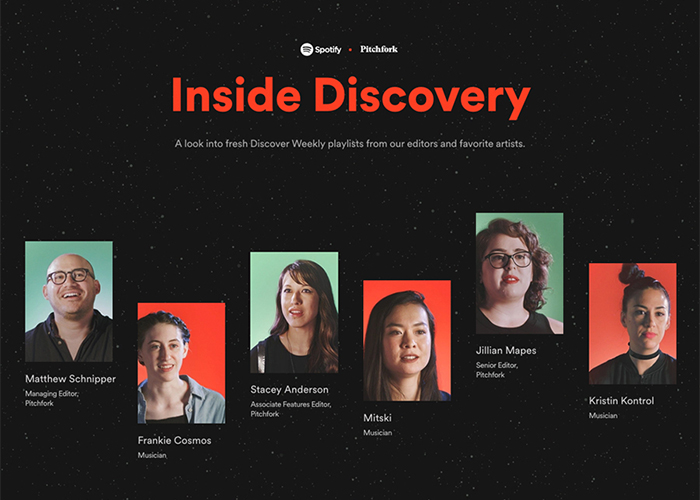Architecture students from the University of Innsbruck have designed and built an angular timber and glass structure to provide a place for youngsters in the Austrian city to develop creative skills (+ slideshow). (more…)
Saturday, July 30, 2016
House with stone walls built by Spasm Design around a sunken courtyard in India
Thursday, July 28, 2016
Spotify x Pitchfork: Inside Discovery

Tuesday, July 26, 2016
Designers and architects describe "shock" in their offices after Brexit vote
Brexit design summit: how has the EU referendum affected the UK's architects and designers and what will Brexit mean for the sector? Dezeen convened a summit of leading practitioners, retailers, writers and lawyers to discuss the implications and explore what action can be taken. (more…)
ABK updates 1960s leisure centre with new Corten-steel facade
Architecture firm ABK has overhauled an ageing leisure centre in County Tipperary, Ireland, with the addition of a new weathering-steel facade (+ slideshow). (more…)
Friday, July 22, 2016
The New Ghostbusters Is Full of Missed Opportunities

The Essence of Cuteness, and All the Other News You Missed This Week

Wednesday, July 20, 2016
A New Map of the Brain Redraws the Boundaries of Neuroscience

Friday, July 15, 2016
The Mad Dash to Clean Up Rio's Guanabara Bay Before the Games

Thursday, July 14, 2016
Top Weed Stores
 Marijuana law is set to go into result subsequent month, but it could get 18 to 24 months to create all the regulations and get retailers up and operating to promote us healthcare marijuana. The requirements, even though, are currently set for tracking the plants, certifying physicians, and licensing growers, dispensaries, and physicians. Also made the decision: It will only be offered in pill, oil, vapor, ointment, or liquid kind. No smoking permitted, expanding, either.
Marijuana law is set to go into result subsequent month, but it could get 18 to 24 months to create all the regulations and get retailers up and operating to promote us healthcare marijuana. The requirements, even though, are currently set for tracking the plants, certifying physicians, and licensing growers, dispensaries, and physicians. Also made the decision: It will only be offered in pill, oil, vapor, ointment, or liquid kind. No smoking permitted, expanding, either.It's all been a lengthy time coming... click here if you are interested in the best dispensary deals.
Weed Dispensary Directory
In reality, marijuana has over 1000's of many years of healthcare use in human background and not even 1 death has been attributed to the herb. Basically due to the fact of the fact that there is no lethal dose tends to make marijuana a a lot more viable and safer choice for remedy to a selection of ailments and illnesses. We know that the use of medical marijuana can replace the use of certain legal prescription medication that have severe side effects, like accidental death from overdose, but these legal prescription drugs remain legal even although they are significantly much more damaging to the human entire body.
According to the Centers for Ailment Management and Prevention, a lot more folks died from drug overdoses in 2014 than any year on record. The majority of people overdoses involve prescription opioids or pain drugs (OxyContin, Percocet,. Hydrocodone, etc.) Because 1999, prescription opioids sold in the US has almost quadrupled, and so has the variety of opioid overdoses. Many of these "pain pill" deaths could have been prevented with the use of health care marijuana. In 2014, much more than 14,000 people died from overdoses involving prescribed soreness capsules.
Click here for dispensary seo ranking.
But the genuine tragedy concerning health care marijuana is the United States War on Drugs. It has permitted the federal and various state and nearby governments across the country to consider up military arms against its own citizens. It has justified the militarization of police forces across the country. For a nation that claims to be the Land of the Free, we incarcerate far more of our own citizens than any other country in the planet. The United States of America has about 2% of the world's population, but it has 25% of the world's prison population, most of them getting nonviolent drug offenders. Above 50% of individuals getting marijuana expenses. That's correct, marijuana arrests now account for over half of all drug arrests in the United States of the eight.2 million marijuana arrests among 2001 in 2010, 80% were for basically possessing marijuana.
Marijuana terms
Cannabis dispensary
Weed Store
Medical Marijuana Dispensary
Pot Shop
Head Shop
Kush Dispensary
420 Shop
Weed Hookup
Dispensary Deals
And the US taxpayer has been footing the bill. According to drugpolicy.org the US War on Drugs price the American taxpayer more than $51 billion yearly. As it at the moment previously charges over $30,000 to imprison 1 man or woman for one year.
If the war on medicines was operating, it need to make drugs a lot more scarce, hence driving charges up. In reality, drug rates have stayed about the identical in excess of the past twenty many years, displaying the War on Drugs has had virtually no effect on the black industry of unlawful medication. The only thing the War on Medication has been effective at is arresting and imprisoning our citizens at an alarming rate. The 1 certain way to wipe out an illegal black market is to legalize the really point that has been made unlawful. In this way specific states are currently catching on and adding hundreds of thousands and millions to their tax revenues each and every yr. Even though their citizens are enjoying the accurate which means of freedom.
Click here for cannabis shop web design.
Our Jamestown settlers really brought marijuana to our shores way back in 1611 when they established the 1st everlasting English settlement right here. By the 1890's it was turning up in a assortment of prescription drugs and was freely sold in pharmacies. Then in the 1920's, Mexican immigrants launched us to its recreational use, and the rest, as they say, is background.
Fast forward to 2016, and:
Medical marijuana is legal in 24 states and D.C., with Pennsylvania the most recent to sign on.
Legalization of medical marijuana is at the moment pending in Florida, Kentucky, Missouri, Nebraska, South Carolina, and Tennessee.
Marijuana is legal for grownup and healthcare use in 4 states: Colorado, Washington, Oregon, and Alaska-and D.C., also, but accompanied there by rigid restrictions.
Meanwhile, it's one particular helluva income-maker, so no wonder price range-strapped states can't look to resist the lure. The numbers speak for themselves. Back in 2014, adult use amounted to $373.8 million; add in the complete for health-related marijuana sales and the figure comes in at a whopping $4.six billion!
Click here for best California marijuana dispensaries
Plus, by 2020, it's projected that grownup use income will volume to $12.1 billion, although health care income will top $10.7 billion, for a complete of $22.8 billion. Talk about filling the coffers!
So now it's Pennsylvania's turn at the trough. Without a doubt, despite the fact that our law is brand new, marijuana entrepreneurs are presently lining up. Says Doug Porter of the Cannabis Occupation Institute, "This is a prime time to start off a marijuana enterprise." Certainly, people in the know actually count on some 245,000 sufferers to signal on appropriate away and revenue to rapidly top $100 million.
Adds Michael Bronstein, co-founder of the American Trade Association for Cannabis and Hemp in Philadelphia: "Pennsylvania could be 1 of these robust states. There is a severe marketplace right here."
Wednesday, July 13, 2016
Boston Considers Landmark Status For Legendary Citgo Sign
The Boston Landmarks Commission voted to study whether the modern - and some say - tacky, Citgo sign is culturally important enough to warrant state protection as a historic landmark.
Tuesday, July 12, 2016
The Moment CSS Started Making “Sense”
It was way back in 2008 that Chris shared his "Ah-ha!" moment when working with CSS. You know, that metaphorical lightbulb that ignites when you go from not knowing what the heck CSS is to suddenly having a baseline for understanding how it works.
For Chris, it was the combination of three concepts:
- Every page element is a box
- I can control the size and position of those boxes
- I can give those boxes background images
It's funny how something seemingly so simple can snowball into a skill that defines a career, whether that's designing websites for clients or starting a blog like this one.
There's a timeless quality to recalling the "Ah-ha!" moment for anyone. The CSS-Tricks team has grown in the eight years since Chris wrote that post, so we thought it would be fun to poll ourselves and share the moments where CSS started making sense for each of us.
Geoff Graham
CSS started to make sense for me when I realized that it was a document containing styles used by an HTML file and that classes were placeholders for where styles should be inserted.
This is somewhat similar to Chris' experience, but more on the document level of things. I wondered how a web browser was able to change the presentation of a page simply based on what was in the HTML document and all I saw was something like this:
A Headline
A clever subtitle
The content and all that.
Copyright 2006
I couldn't for the life of me understand how that chunk of markup could be transformed to a full-fledged design. That is, until I saw the linked CSS file in the document :
Opening that file got the ol' hamster wheel in my brain turning and led me to start looking at the markup on an element-by-element basis. Where I was looking at the HTML markup as a whole, I was starting to look at it in blocks:
A Headline
A clever subtitle
...where that block corresponds to the rules for .header in the stylesheet. I could see how the height for that block was given a height, a background image, and even could change the color and size of the text within it.
Robin Rendle
I was sitting in my backyard fumbling my way through Jeffrey Zeldman's Designing with Web Standards when it struck me: web design could go far beyond making my dumb band's website. With a single command it was possible for websites to reveal their guts, their internal logic, as by that time the Web Inspector would permit me to move boxes on the screen with changing one of the values for padding or margin.
However, it wasn't until I experimented with this line of CSS that I was hooked:
.element {
float: right;
}With this tiny string of code I could break the whole page, I could smash columns of text together and hurl images off into oblivion; the treasured words of the author were mine to squeeze and stretch, no matter how ugly the end result might be.
I realize now that it's in this wanton destruction of other people's websites where everything began to make a little sense. Even today, as a professional web designer, I still get a kick out of breaking things and treating websites like my own personal playground.
Sarah Drasner
I'm an old timer, I was building web pages back in the days of tables before CSS was around. When it first came out, I was skeptical. For me, the big turnaround was CSS Zen Garden. This site did such an amazing job showing how presentation and content could be decoupled, and the sheer power of CSS in terms of layout and control. The ability to not repeat myself and declare something once and have it propagate everywhere had me giddy.
But my "Ah-ha!" moment in working with CSS was a little different. Mine was pretty similar to Chris', in that it started with boxes, but with a slight variation:
- There are elements that work like boxes, which you can control position and spacing for.
- There are elements that work like text, which you control through line-height, font, etc.
- If I think about how the browser sees the elements and styling, I can debug it.
Past that point, I got into the sheer creative wonder of working with CSS. It started with where code meets design, but has since moved further. Imaginative programming, like animation, generative code, and all the extra magic like for loops. Organizational power for architecting design systems, with mixins, extends, and variables that SASS allows for.
What was your moment?
Many people shared their experiences in the last post Chris wrote, but it would be interesting to know what that moment is for others who may have started working with CSS since it was published.
We also posed the question on Twitter:
A long time ago we talked about your "CSS Ah-ha! Moment"https://t.co/UGKciONYUl
Let's do it again!
When did you start to "get" CSS?
- CSS-Tricks (@Real_CSS_Tricks) July 6, 2016
We got some interesting replies! Here's a few:
@Real_CSS_Tricks head { display: block;} was a big one for me
- James Nowland (@jnowland) July 6, 2016
@Real_CSS_Tricks that position: absolute is positioned relative to the nearest positioned ancestor
- Patrick Marx (@ptrckmrx) July 7, 2016
@Real_CSS_Tricks Probably when I made a deal with the Devil.
- Billy Purvis (@mrmonkeytech) July 6, 2016
What was your moment? Were you viewing a website's source to dig for answers? Or perhaps a friend was showing you the ropes? Maybe it was even a blog post you read and still have bookmarked to share. Whatever it is, please share in the comments!
The Moment CSS Started Making “Sense” is a post from CSS-Tricks
Saturday, July 9, 2016
Post-Brexit, Ireland Faces Economic And Political Downturn
Ireland is not happy with Britain's decision to leave the EU. Correspondent Frank Langfitt tells NPR's Lynn Neary that the country faces economic uncertainty and border issues with Northern Ireland.



